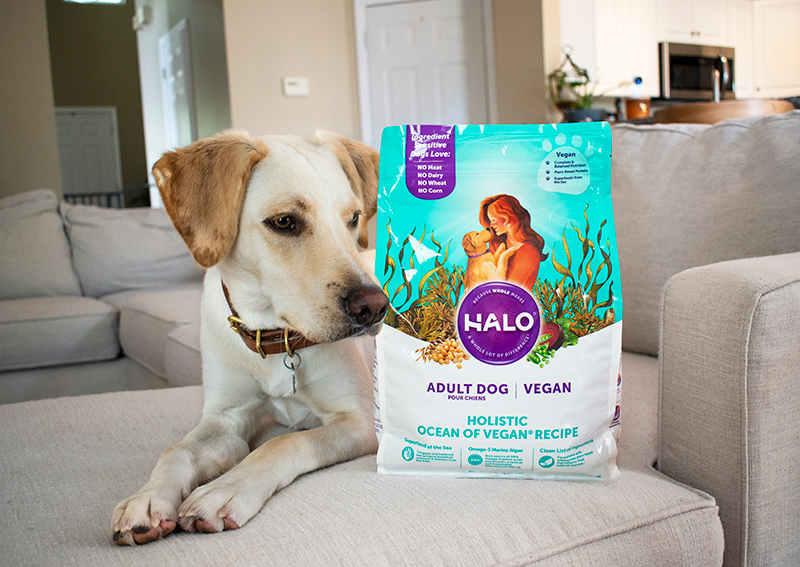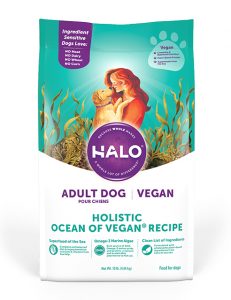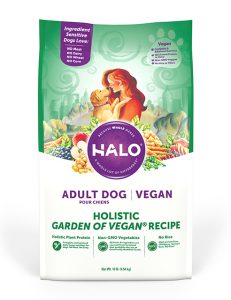This is probably the most common question concerned pet parents ask when discussing plant-based dog food. This is for good reason, of course, because no matter the motivations behind feeding a plant-based food, we all want to be certain that it will be healthy for our companions!
Let’s break it down piece by piece and explore why this question is asked as well as what the answer will be.
Don’t dogs need meat?
Domesticated dogs evolved from wolves, and both species are taxonomically classified under the Order Carnivora. While this makes them sound like meat-eating carnivores, the Order Carnivora not only includes true carnivores like the Felidae family, but also omnivores like the Canidae family, and even the Ailuropodiae family—which includes herbivorous pandas! Furthermore, domesticated dogs evolved from naturally omnivorous wolves whose co-evolution with humans resulted in an adaptation of their digestive system to a more starch-rich diet. That’s right, Fido and Spot have been eating our scraps for tens of thousands of years, and they are very well suited for it.
In animal nutrition, we really prefer to talk about nutrient requirements, as opposed to ingredient requirements. Research on the nutrient requirements of dogs extends back to the first National Research Council publication on the topic in 1953. Since that time, independent researchers, industry researchers and veterinarians have all been continuing to fine-tune our knowledge and understanding of just exactly what dogs need to be healthy and thrive. As far as we know, dogs have no requirement for meat per se, instead, they have a requirement for nutrients which may be obtained from meat, or from other sources.
So dogs need nutrients, not ingredients, but can they get all the nutrients they need from a vegan diet?
Yes. None of the essential nutrients required by dogs are found exclusively in animal tissues. Admittedly, some are found in high concentrations in animal tissues and may be more difficult to find elsewhere, but there is not a single essential nutrient for dogs which we cannot obtain from non-animal sources. The Association of American Feed Control Officials, known as AAFCO, has determined that the sufficiency of a diet to meet the nutritional requirements of dogs can be defined in two ways: the diet can be formulated to meet the industry recommendations or the diet can be tested by dogs themselves in a feeding trial. In terms of meeting nutritional requirements, any diet, regardless of ingredients, meeting either of these stipulations is recognized to be just as sufficient as any other diet meeting AAFCO’s ‘complete and balanced’ criteria. What this means, is that a plant-based diet bearing an AAFCO statement of adequacy contains all of the essential nutrients required by the species and life-stage denoted on the statement.
Furthermore, not only are plant-based diets, like Halo’s Ocean of Vegan and Halo’s Garden of Vegan, suitable for healthy dogs, but plant-based diets have even been used extensively in veterinary practice to diagnose and/or manage common diseases, as Dr. Heinze, a board certified veterinary nutritionist, mentions in her rebuttal to a popular criticism of vegan dogs back in 2016. Animal-derived proteins are some of the most common allergens in dogs, making plant-based diets a fantastic option for diagnosing and managing dietary hypersensitivity. A handful of meat-free vegetarian diets also exist, though these contain eggs, dairy, or other animal products not directly associated with slaughter. These diets may not be as useful from a veterinary perspective, and are not typically as popular as strictly plant-based diets are, since many people choose to feed a meat-free diet to avoid the inherent cruelty to animals stemming from animal-derived products.
Alright, dogs can survive on vegan diets, but can they thrive?
When people ask if plant-based diets are healthy, this is really what they are asking most of the time. Sure, dogs can live on plant-based diets, I think just about everyone can agree on that point. BUT, will they be as healthy, as full of energy, as shiny and bouncy, as a dog fed a diet containing animals products?
The answer to this really depends on two things: what diet was the dog eating before, and what plant-based diet are you looking to switch them to? When you’re looking to switch your dog’s diet, there are a handful of considerations to keep in mind. Are you changing the diet because of a health or wellness problem, such as a dry coat or fat intolerance? Or are you happy with how your dog is faring on their current diet, but would like to switch to a suitable plant-based diet? In both cases, check the nutritional information provided by both diets and make sure that the nutrients of most interest to you will be the either the same or improved in the new diet you are selecting. For healthy dogs, the customer help line, provided by the company whose diet you are looking to try, can be a valuable resource, as you can discuss your dog’s individual needs and determine which diet is best for them. For dogs with a health condition, always discuss dietary changes with your veterinarian.
I hope this has served to illustrate that complete and balanced plant-based dog food is indeed healthy. For a more in-depth discussion, I encourage interested parties to read this review of plant-based vs. animal-based diets published by a veterinarian in an open-access peer-reviewed journal.
Best wishes and tail wags,
Dr. Sarah Dodd



